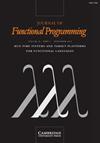Not by equations alone
IF 1.1
3区 计算机科学
Q4 COMPUTER SCIENCE, SOFTWARE ENGINEERING
引用次数: 1
Abstract
Abstract The challenge of reasoning about programs with (multiple) effects such as mutation, jumps, or IO dates back to the inception of program semantics in the works of Strachey and Landin. Using monads to represent individual effects and the associated equational laws to reason about them proved exceptionally effective. Even then it is not always clear what laws are to be associated with a monad—for a good reason, as we show for non-determinism. Combining expressions using different effects brings challenges not just for monads, which do not compose, but also for equational reasoning: the interaction of effects may invalidate their individual laws, as well as induce emerging properties that are not apparent in the semantics of individual effects. Overall, the problems are judging the adequacy of a law; determining if or when a law continues to hold upon addition of new effects; and obtaining and easily verifying emergent laws. We present a solution relying on the framework of (algebraic, extensible) effects, which already proved itself for writing programs with multiple effects. Equipped with a fairly conventional denotational semantics, this framework turns useful, as we demonstrate, also for reasoning about and optimizing programs with multiple interacting effects. Unlike the conventional approach, equational laws are not imposed on programs/effect handlers, but induced from them: our starting point hence is a program (model), whose denotational semantics, besides being used directly, suggests and justifies equational laws and clarifies side conditions. The main technical result is the introduction of the notion of equivalence modulo handlers (“modulo observation”) or a particular combination of handlers—and proving it to be a congruence. It is hence usable for reasoning in any context, not just evaluation contexts—provided particular conditions are met. Concretely, we describe several realistic handlers for non-determinism and elucidate their laws (some of which hold in the presence of any other effect). We demonstrate appropriate equational laws of non-determinism in the presence of global state, which have been a challenge to state and prove before.不是单靠方程
摘要对具有(多种)影响(如突变、跳跃或IO)的程序进行推理的挑战可以追溯到Strachey和Landin作品中程序语义的诞生。事实证明,用单子来表示个体效应和相关的等式定律来推理它们是非常有效的。即便如此,也不总是清楚什么定律与monad相关——这是有充分理由的,正如我们在非决定论中所展示的那样。将使用不同效果的表达式组合在一起,不仅给不组合的单子带来了挑战,也给等式推理带来了挑战:效果的相互作用可能会使其各自的规律失效,并引发在单个效果的语义中不明显的新特性。总的来说,问题在于判断法律是否充分;确定法律是否或何时继续适用于添加新效果;以及获得并容易验证紧急定律。我们提出了一个依赖于(代数,可扩展)效果框架的解决方案,该框架已经证明了自己可以编写具有多种效果的程序。正如我们所展示的,这个框架配备了一个相当传统的指称语义,对于具有多种交互效果的程序的推理和优化也很有用。与传统方法不同,等式定律不是强加在程序/效果处理程序上,而是由它们诱导而来:因此,我们的出发点是一个程序(模型),其指称语义除了直接使用外,还提出和证明了等式定律,并澄清了边条件。主要的技术结果是引入了等价的模处理程序(“模观察”)或处理程序的特定组合的概念,并证明它是一个同余。因此,只要满足特定条件,它就可以用于任何上下文中的推理,而不仅仅是评估上下文。具体来说,我们描述了几个现实的非决定论处理者,并阐明了他们的规律(其中一些在存在任何其他影响的情况下成立)。我们证明了在全球国家存在的情况下,非决定论的适当等式定律,这是对国家和证明的挑战。
本文章由计算机程序翻译,如有差异,请以英文原文为准。
求助全文
约1分钟内获得全文
求助全文
来源期刊

Journal of Functional Programming
工程技术-计算机:软件工程
CiteScore
1.70
自引率
0.00%
发文量
9
审稿时长
>12 weeks
期刊介绍:
Journal of Functional Programming is the only journal devoted solely to the design, implementation, and application of functional programming languages, spanning the range from mathematical theory to industrial practice. Topics covered include functional languages and extensions, implementation techniques, reasoning and proof, program transformation and synthesis, type systems, type theory, language-based security, memory management, parallelism and applications. The journal is of interest to computer scientists, software engineers, programming language researchers and mathematicians interested in the logical foundations of programming.
 求助内容:
求助内容: 应助结果提醒方式:
应助结果提醒方式:


